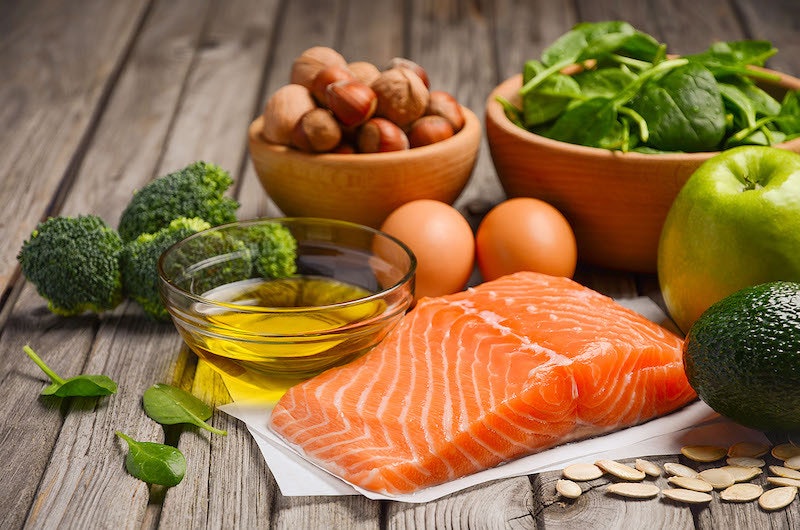You probably know that certain foods are good for your blood pressure or your cholesterol levels. What you might not realize is that what you eat may help your brain power, too. More and more research is pointing to the potential of some foods and nutrients to boost our brain’s ability to focus, remember, and perform tasks more quickly. Certain foods may also have a protective effect on memory and against diseases like dementia, Alzheimer’s, and Parkinson’s.
Here are six brain-friendly food choices and tips for working them into your diet.
1. Blueberries
These summer berries are packed with phenolic compounds, also found in other plant-based foods like apples, plums, cocoa, and coffee. They act as antioxidants to counterbalance free radicals — reactive chemicals in the body that can damage other cells.
Research suggests that regular intake of these compounds can protect our brains cells and improve memory and the ability to learn. A 2020 study in the American Journal of Clinical Nutrition also found that people who ate more foods high in flavonoids, a type of polyphenol, were less likely to develop Alzheimer’s disease and other types of dementia.
How to eat more: Toss a handful of fresh blueberries on salad greens or in a smoothie, or top a bowl of yogurt or oatmeal. Choose fresh or frozen — whichever fits your budget and lifestyle best. Frozen fruits and veggies often have just as many nutrients as fresh, sometimes more, since most are flash-frozen right after being picked.
2. Fatty fish
You’ve probably heard the brain referred to as “gray matter,” but you might not know just why that part of the brain matters so much. Gray matter makes up most of the outer portion of the brain and it helps control important functions like movement, memory, and emotions. But gray matter slowly shrinks over time which accounts for the subtle changes in memory, attention span, and processing speed that happens with the natural aging process. One way to slow that process down? Eat foods high in omega-3 fatty acids. Fatty fish like salmon, sardines, trout, and tuna are some of the best sources of omega-3s, specifically EPA and DHA, which the brain needs the most. Try to eat one to two servings a week.
How to eat more: Having shelf-stable options like salmon pouches and cans of tuna on hand ensures you’ll always have an easy meal option and one that’s packed with omega-3s.
3. Spinach
Vibrant, deep-colored leafy greens like spinach, arugula, kale, collards, and mustard greens are at the top of the list when it comes to promoting memory and brain function. Research attributes most of this to the combination of folate, carotenoids, and vitamin A found in leafy greens. A 2018 study in Neurology suggests that consuming one to two servings of leafy greens every day can add up to a brain that looks 11 years younger compared to the brains of people who rarely eat leafy greens.
How to eat more: Leafy greens aren’t just for salads. You can toss a handful into a smoothie or use them as a base for a grain or legume bowl. Baby spinach is a staple in my fridge not just for salads and cold dishes, but also to stir into hot soups or saucy skillet dishes at the end of cooking.
4. Walnuts
Is boosting brain health as easy as snacking on a few walnuts each day? According to a 2020 review published in Nutrients, it may be. Walnuts contain vitamin E, selenium, flavonoids, and phenolic acids, all nutrients and compounds that are antioxidants. Walnuts also contain the omega-3 fatty acid ALA, which has anti-inflammatory properties that may ease neuroinflammation and reduce risk for the development of degenerative brain diseases.
How to eat more: Nuts are high in calories, so keep an eye on your portion size. Create easy-to-grab baggies with about 14 to 20 walnut halves for a healthy snack. You can also sprinkle chopped walnuts on salads, grain bowls, oatmeal, and smoothie bowls.
5. Eggs
Two eggs contain 50% of your recommended daily intake of choline, an essential nutrient that most Americans don’t get enough of in their diet. Your brain and nervous system rely on choline for muscle control and memory and mood regulation. Some research suggests that choline-rich foods (including beef, chicken, soybeans, fish and potatoes) help with early brain growth and to protect against cognitive loss later in life.
How to eat more: Cook a few hard-boiled eggs at the start of the week to keep in the refrigerator for a quick snack or to toss on salads. I like to make a five-minute veggie scramble with baby spinach, tomatoes, and other ingredients like feta cheese or salsa and black beans.
6. Coffee and Tea
Caffeine’s short-term stimulant effects are usually why many people grab a cup of coffee or tea in the morning. But caffeine may even protect against diseases like Alzheimer’s disease and depression. When part of a healthy diet, a 2016 study found that moderate intake of caffeine may also improve alertness, focus, and reaction time. Green tea can be an even better option than coffee because it has the same benefits, but less caffeine.
How to eat more: Sun tea is a summer treat at my house. I place a few tea bags in a container of cold water, cover, and leave in the sun for a few hours. Toss in a few citrus slices or sprigs of mint for extra flavor. Just remember not to overdo it on caffeine. Most people can safely consume 400 mg or less a day of caffeine. An 8-ounce cup of coffee usually has between 80 to 100 mg of caffeine while an 8-ounce cup of green or black tea usually has between 30 to 50 mg.






